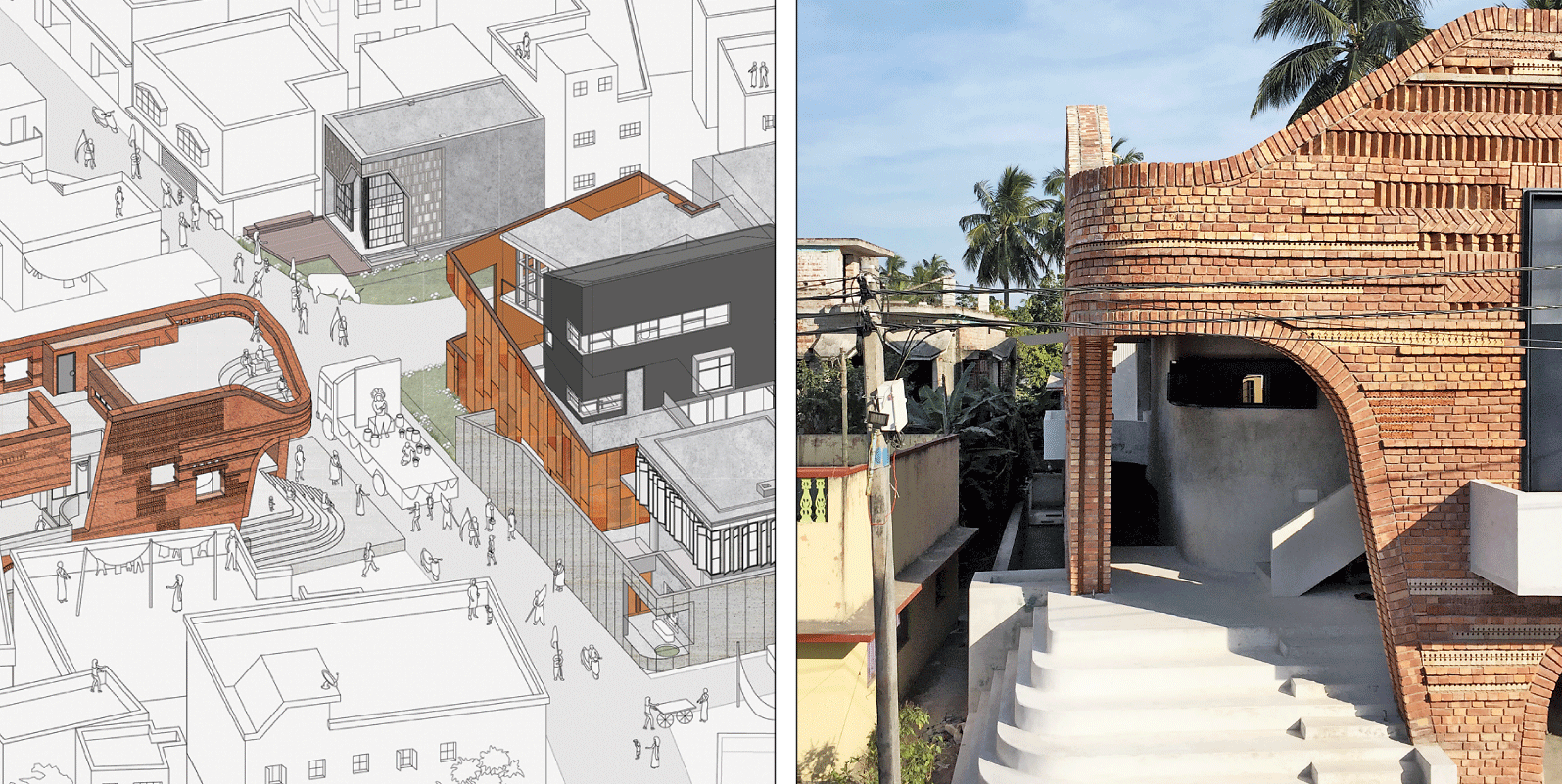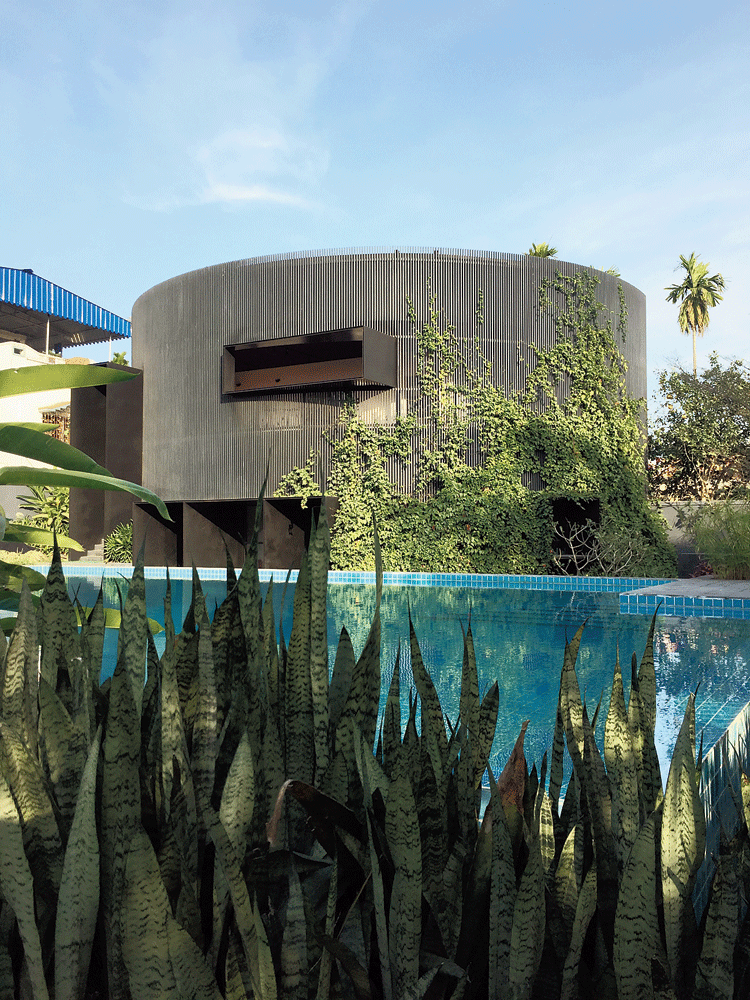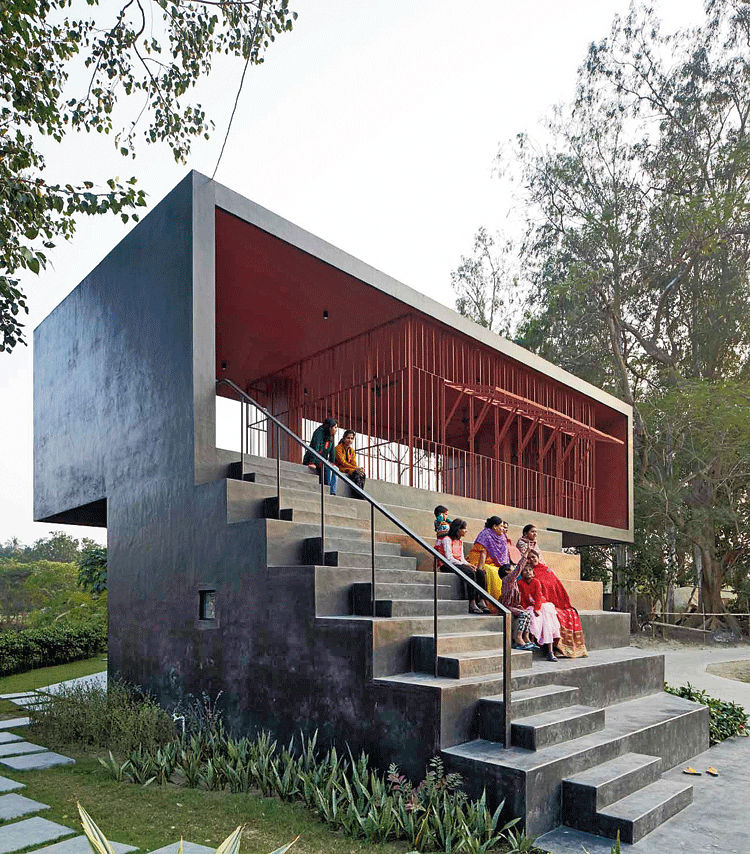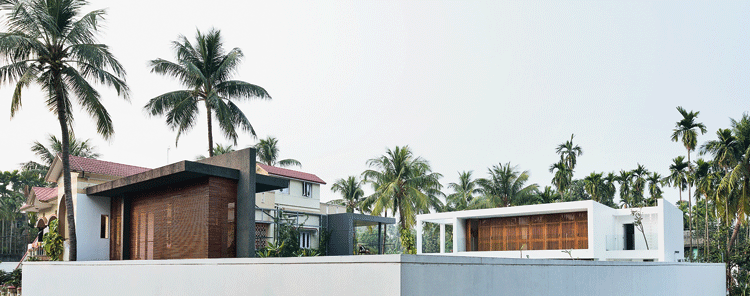
(From left) The architectural illustration for a Bansberia locality; a terracotta community centre inspired by the local Hansaraj temple in Bansberia

A modern extension to an old house in Bansberia where the old structure now has a glass and metal facade with a large “rural window to the countryside”

A clubhouse for Saptagram Coaching Club. Picture courtesy: Edmund Sumner
Several old homes and a few public buildings in a town about 90km from Calcutta have got a modernist makeover in the past few years.
A son of the soil, Abin Choudhury who is an architect, is behind all this. What started as an experiment on a house in Bansberia caught the fancy of many.
As a result, pool houses, contemporary extensions of old generation buildings, a terracotta-inspired community centre, a glass-and-metal thakurdalan, a metal-and-concrete sports pavilion with a renovated ghat now dot Bansberia and adjoining Adisaptagram.
Choudhury has been invited by CEPT University (formerly the Centre for Environmental Planning and Technology), Ahmedabad, to exhibit his interventions in Bansberia-Adisaptagram that has introduced an entire community to design aesthetics and architecture.
It was in 2012 that Choudhury, who has lived in Bansberia for most part of his life, decided to help out the local club, Kishor Sangha Community, with their annual Kartik puja pandal on the municipal grounds.
“I tried to introduce good design as an idea to the community through the pandal,” he said.
The architect is now involved with Durga Puja in the city in a big way.
The installation with painted bamboo and reflective stickers had drawn local and as well as international attention. A brick kiln owner from Adisaptagram, Kamal Das, appointed him to build an extension for his home — a departure from the prevalent norm of engaging contractors and masons.
“I was never consulted when my father renovated our ancestral home in Bansberia,” Choudhury said.
At Das’s house, a verandah now leads from the old building, screened off with greenery, to the modern extension, which is all white and grey with louvered wooden doors creating a play of light and shadow on the floor. The extension includes a pool, a gym, and guest rooms.
“I have lived in Calcutta in well-appointed houses. So, when I went back to live in Adisaptagram, I asked Abin to design a modern house for me keeping my father’s old house intact,” Das said.
Choudhury has done a similar project of building a modern extension to an old house in Bansberia, too. The old structure now has a glass and metal facade with a large “rural window to the countryside”.
A kilometre away from the pool house, an unfinished double-storey building with rows of gallery steps is his designed panchayat community hall. “The gallery is for people to sit and watch the Kartik Puja procession,” Choudhury said.
Arched and inverted arched windows mark the eastern wall with similar motifs replicated on a larger scale on the front facade.
Here, too, the wall has rectangular “rural windows” that let its residents have a view of the outside without losing their privacy. Inside is a 10,000sq ft dwelling space complete with inner courtyards, pools, gardens, and gym.
On the other side of the crossing is the Narayantala thakurdalan, a covered podium for religious ceremonies. With no residing deity inside, the thakurdalan nonetheless is a place of worship with people stopping by to do a quick pranam.
When he was building Saha’s house, members of the trust running the thakurdalan approached him to rebuild it. Choudhury came up with a structure with glass and grille gates that open up to reveal the dalan.
But the most striking of all is the terracotta community centre. The land belonged to Saha who wanted a garage there. Choudhury convinced him to do something for the people instead. Inspired by the local terracotta Hansaraj temple, the centre has exposed brick masonry walls inlaid with ceramic blocks.
The community hall project came with a lot of constraints from the panchayat governing bodies, Choudhury, who took up the public project to reach out to more people, said. The building had to be made with minimal changes to the existing footprint and it had to be within the specified budget, he said.
Football is a way of life in Adisaptagram. The Saptagram Coaching Club approached Choudhury to build a clubhouse for players.
It had to be at one corner “at an angle to get the whole view of the field”.
Red grilles, which open on their hinges, form the viewers’ gallery. The adjacent ghat has been spruced up as well. “Many of us have studied with Abin at the pathshala and we requested him to build a clubhouse for us. He readily took over, arranging materials, labour, funds... everything. As a sports club we had only Rs 3 lakh from the government,” Subhankar Som, the club secretary, said.
A busy crossing in Bansberia is marked by three constructions. At one corner stands a private house of Baidyanath Saha, who wanted Choudhury to build a 12ft-high boundary wall around the house. But the wall would be a disaster at an accident-prone crossing.
“I convinced him that the wall had to be at the corner to enable clear sight lines around the turn. The space outside the wall was landscaped with low-height shrubbery as enhancement of the footpath,” Choudhury said.











